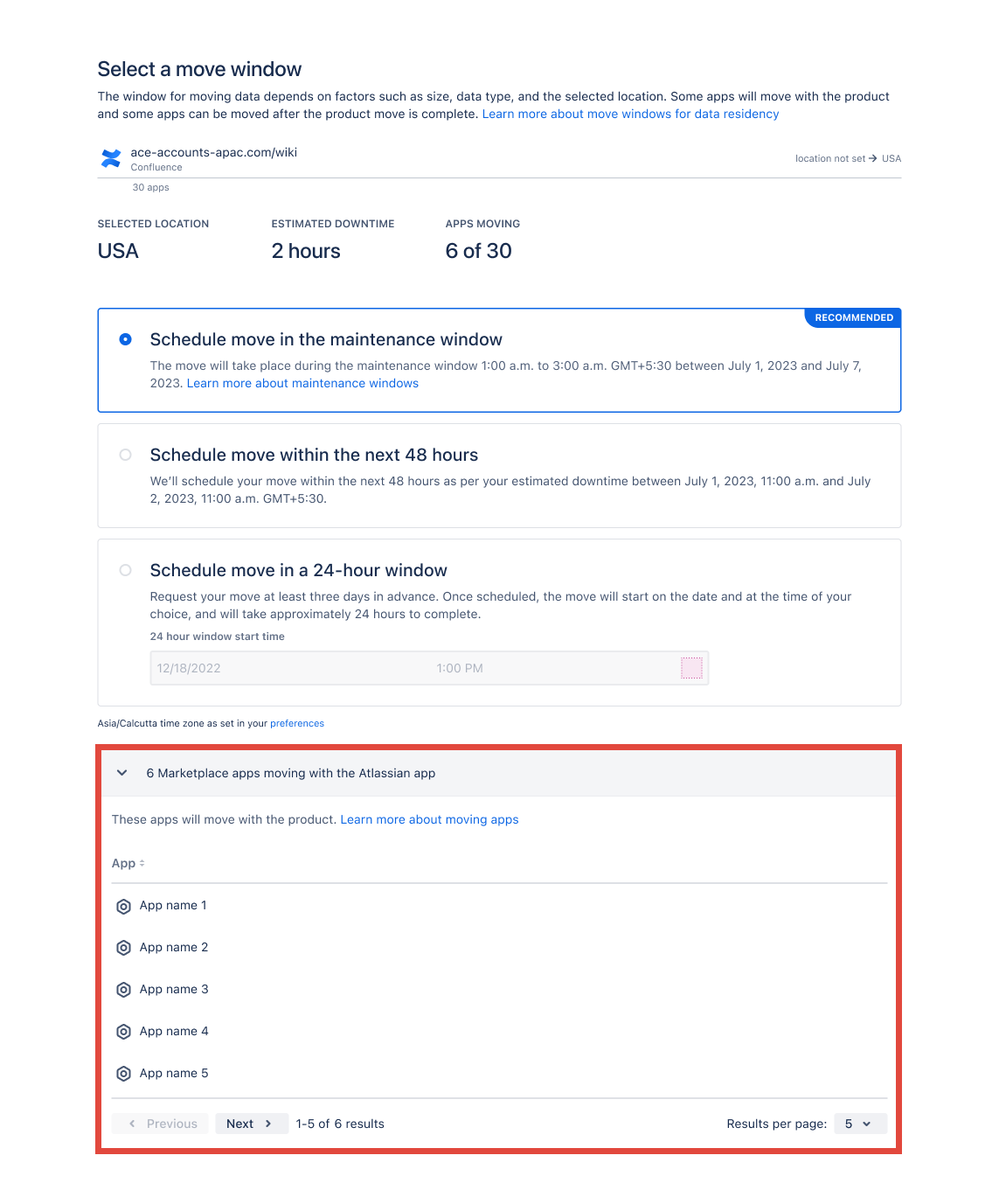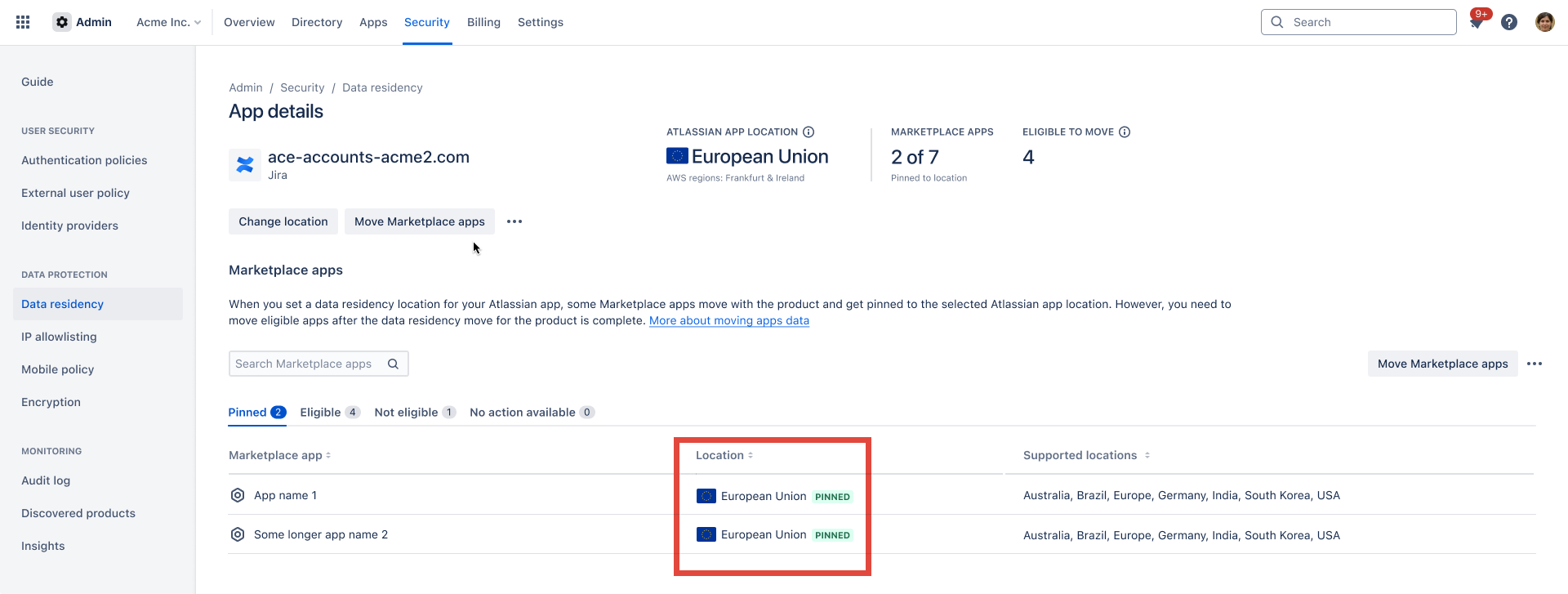Data residency
To help partners more easily meet customer data residency needs, we have enabled data residency support for apps that use persistent Forge hosted storage , as well as allowing realm pinning for apps for apps that use Forge Remote.
For apps that use persistent Forge hosted storage, Forge will take care of the hosting, pinning, and migration of hosted data between supported locations, so partners can focus on building a high quality app for their customers.
This solution is designed to work harmoniously with Atlassian app data residency and consequently is based on similar concepts and terminology.
For more information about how the Atlassian cloud addresses the data residency needs of organizations, see Manage data residency
How it works
Jira and Confluence users on the Atlassian cloud can move their data to any supported location. When this occurs, the Atlassian cloud infrastructure will migrate the customer's Atlassian app data to that location.
In line with this, we have enabled data residency support for apps that choose to use persistent Forge hosted storage. Since Forge uses a similar cloud infrastructure for its hosted storage, partners that choose to store their app’s data on persistent Forge hosted storage will enable Forge to move that data to an admin’s chosen location.
This means that the data from both Atlassian app and all Forge apps using persistent Forge hosted storage will be hosted in the admin's chosen location. As a result:
- If an admin installs an Forge app using persistent Forge hosted storage on an Atlassian app that's pinned to a location, the app will automatically be located there too.
- If an admin migrates the data of a pinned Atlassian app to a different location, then all installed, Forge apps using persistent Forge hosted storage will also be migrated there as well.
In addition, Forge supports remote data residency. This allows you to pin remote endpoints to specific geographic regions, ensuring compliance with data residency requirements for data processed or stored outside of persistent Forge hosted storage. By defining region-specific baseUrl values, you can align your apps with customer data residency needs.
Apps that are eligible will be shown with a PINNED status to the admin.
Forge will aim to execute its invocations from the same location as the host Atlassian app. See Multi-region compute for more details.
Eligibility
A Forge app is eligible for PINNED status under any of the following conditions:
-
All in-scope End-User Data is stored exclusively in persistent Forge hosted storage: If your app uses only persistent Forge hosted storage for all in-scope End-User Data, it qualifies for
PINNEDstatus without additional configuration. -
The app stores in-scope End-User Data remotely but uses Forge Remote data residency with region-specific URLs: Apps can maintain eligibility for
PINNEDstatus if they store in-scope End-User Data in a remote backend configured with region-pinned URLs. This requires setting up the manifest file with region-specificbaseUrlvalues and marking them withinScopeEUD: trueto meet data residency requirements. For information on how to do this, see Remotes. -
The app uses a remote backend but does not store in-scope End-User Data there: f your app interacts with remote backends solely for operations that do not involve storing in-scope End-User Data, it can be eligible for
PINNEDstatus. To ensure compliance, you must configure your manifest file appropriately. For information on how to do this, see Remotes.
By default, Forge assumes an app stores in-scope End-User Data remotely if its manifest file includes:
- An external domain defined in fetch (see Runtime egress permissions for additional details)
- Any remote without operations defined (see Forge Remote for additional details)
In addition, when an admin initiates moving their Jira or Confluence instance to a location, they'll see which apps can move at the same time. These may include Forge apps that are eligible for PINNED status which may move at the same time as the Atlassian app.

In-scope End-User Data
Forge developers will be responsible for defining, documenting, and communicating with their customers what data is in-scope and out-of-scope for data residency for their Forge app (see Atlassian’s in-scope data as an example). Admins use this list of information to understand an app’s suitability and compliance with relevant data residency regulations.
You’ll need to publish what data your app considers in-scope and out-of-scope for data residency in your own documentation.
Marketplace listing
You can leverage the Atlassian Marketplace to advertise the app’s support for data residency (specifically, its eligibility for PINNED status).
You can do this through your app’s Atlassian Marketplace listing. Specifically, when providing your app’s Privacy and Security information, respond accordingly to the following questions:
| Questions | Correct option |
|---|---|
| Does your app support data residency options? |
Yes. App supports data residency (You must fill out the details based on your app) |
| Does your app support migration of in-scope End User Data between your data residency supported locations? | Yes. (If your app is not using Forge Remote for storing in-scope End User Data) |
Upon updating this information, it will be available on your app’s Privacy and Security tab. For more information, see Privacy and Security tab in your Marketplace listing.
PINNED Atlassian app location
When an admin moves their Jira or Confluence data to a location, the status of the Atlassian app
will then appear as PINNED in the admin’s Data residency interface:

The PINNED Atlassian app status lets admins verify that their Atlassian app's in-scope data is
hosted on the chosen location. You can learn more about how admins pin their Atlassian app data in
Move product data to another location.
In-scope Atlassian app data refers to all data stored by an Atlassian app that can be pinned. See Understand data residency for more information.
PINNED app location
After an admin verifies that their Atlassian app data is pinned to a location, they also need to verify
that all in-scope end-user data for an app is also pinned. Apps pinned to the same location as the Atlassian app will be
displayed as PINNED in the admin's Data residency interface:

The PINNED app status provides admins with the verification that an app's data is hosted in the
same location as the Atlassian app.
When an admin installs an eligible Forge app on an Atlassian app that is already PINNED, the app will
automatically be displayed as PINNED as well.
Supported locations
Admins can pin their Atlassian app data and hosted Forge app data to a number of supported locations, namely:
| Location | AWS regions |
|---|---|
| Global | In-scope data is hosted within realms determined by Atlassian: data may be moved between realms as needed. |
| Australia | In-scope data is hosted within the Australia (Sydney) region. |
| Canada | In-scope data is hosted within the Canada (Central) region. |
| EU | In-scope data is hosted within the Europe (Frankfurt) and Europe (Dublin) regions. |
| Germany | In-scope data is hosted within the Europe (Frankfurt) region. |
| India |
In-scope data is hosted within the Asia Pacific (Mumbai) regions. Note: India is not assigned as the default data residency location, even for organizations based in India. You can manually set data residency to India through the Atlassian Administration interface. |
| Japan | In-scope data is hosted within the Asia Pacific (Tokyo) region. |
| Singapore | In-scope data is hosted within the Asia Pacific (Singapore) region. |
| South Korea | In-scope data is hosted within the Asia Pacific (Seoul) region. |
| Switzerland | In-scope data is hosted within the Europe (Zurich) region. |
| United Kingdom | In-scope data is hosted within the Europe (London) region. |
| USA | In-scope data is hosted within the US East (North Virginia) and US West (Oregon) regions. |
Data residency for persistent Forge hosted storage will automatically include any new location that the Atlassian cloud infrastructure supports.
Multi-region compute
Forge will aim to execute its invocations from the same location as the host Atlassian app. This helps Forge optimize for an app's reliability and performance (as well as facilitate security and fraud prevention).
To support some Atlassian cloud capabilities and maintain overall reliability, Forge may sometimes execute an app's invocation from a location other than the location where the host Atlassian app is.
Observability
Tracking, logging, and auditing is an integral part of supporting data residency. The Developer Console provides audit log features that will allow you to do this; these features provide records for related events (such as when an admin pins their Atlassian app and Forge app to a location).
Rate this page: